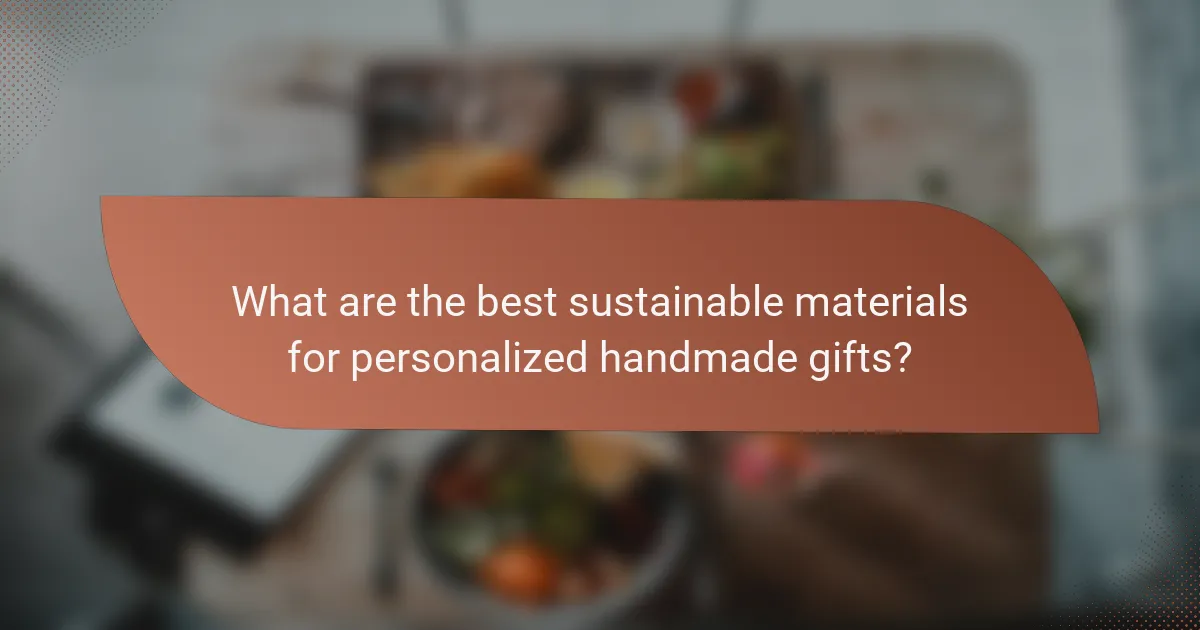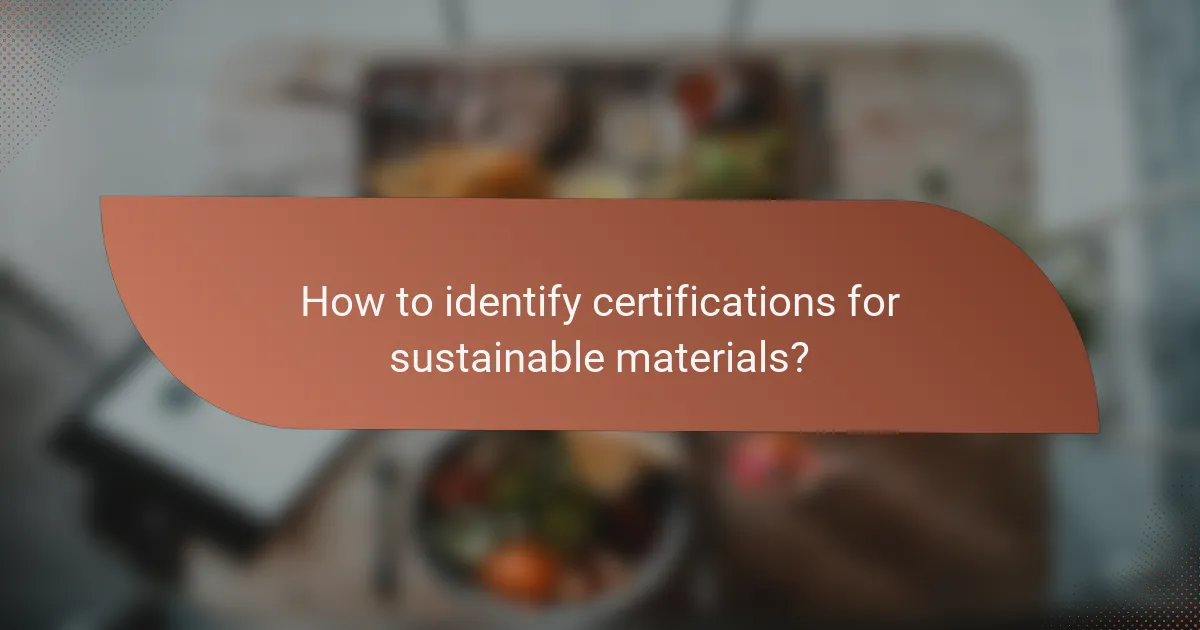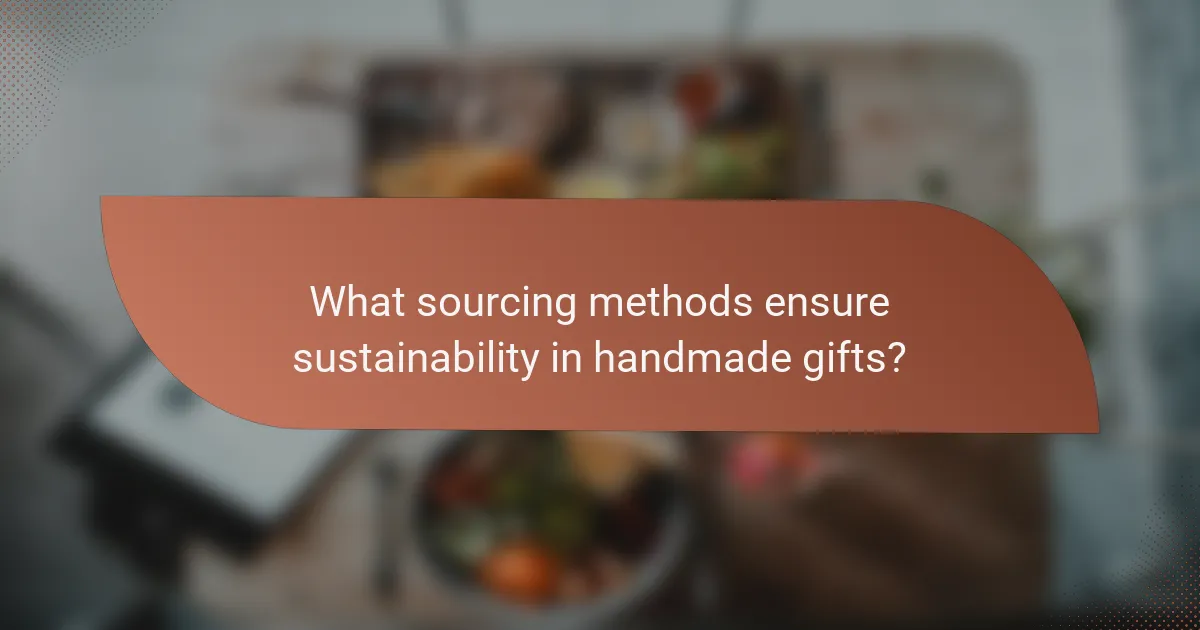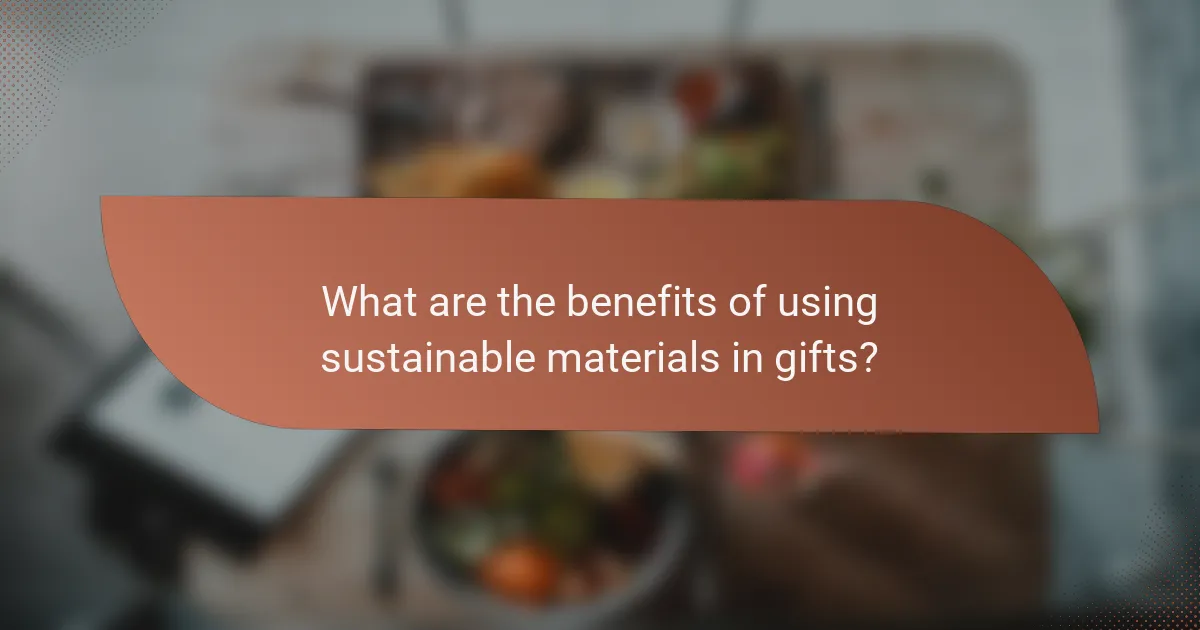When creating personalized handmade gifts, selecting sustainable materials is essential for both environmental impact and quality. Options like organic cotton, bamboo fiber, and recycled paper not only enhance the uniqueness of each item but also align with eco-friendly practices. Additionally, understanding certifications and sourcing methods can help ensure that your gifts are produced responsibly, supporting local economies and ethical standards.

What are the best sustainable materials for personalized handmade gifts?
The best sustainable materials for personalized handmade gifts include organic cotton, bamboo fiber, recycled paper, hemp fabric, and biodegradable plastics. These materials not only reduce environmental impact but also offer unique qualities that enhance the appeal of handmade items.
Organic cotton
Organic cotton is grown without synthetic pesticides or fertilizers, making it a healthier choice for both the environment and consumers. When selecting organic cotton for gifts, look for certifications like GOTS (Global Organic Textile Standard) to ensure quality and sustainability.
This material is soft, durable, and versatile, suitable for items such as clothing, bags, and home textiles. Consider using organic cotton for personalized gifts that require printing or embroidery, as it holds designs well.
Bamboo fiber
Bamboo fiber is derived from the fast-growing bamboo plant, known for its minimal water and pesticide requirements. It is naturally antibacterial and biodegradable, making it an excellent choice for eco-friendly gifts.
Items made from bamboo fiber, such as kitchenware, textiles, and personal care products, are not only sustainable but also stylish. When sourcing bamboo products, ensure they are produced using sustainable practices to maximize their eco-friendliness.
Recycled paper
Recycled paper is made from post-consumer waste, reducing the need for virgin materials and conserving resources. It is ideal for personalized gifts like cards, gift wrap, and stationery.
When choosing recycled paper, look for products with high percentages of post-consumer content. This ensures better sustainability and supports the recycling industry, making your gifts both thoughtful and environmentally responsible.
Hemp fabric
Hemp fabric is made from the fibers of the hemp plant, which requires little water and no pesticides to grow. It is known for its strength, durability, and natural resistance to mold and UV light, making it a practical choice for various handmade gifts.
Consider hemp for items like bags, clothing, and home decor. When purchasing hemp products, check for certifications that guarantee sustainable farming practices to ensure your gifts are eco-friendly.
Biodegradable plastics
Biodegradable plastics are designed to break down more quickly than traditional plastics, reducing their environmental impact. These materials can be made from renewable resources like cornstarch or sugarcane, making them suitable for various applications.
When using biodegradable plastics for personalized gifts, such as packaging or decorative items, ensure they meet relevant standards for biodegradability. This helps ensure that your gifts are not only unique but also contribute to a healthier planet.

How to identify certifications for sustainable materials?
Identifying certifications for sustainable materials involves looking for recognized standards that ensure environmental and social responsibility. These certifications indicate that products meet specific criteria for sustainability, which can guide consumers in making informed purchasing decisions.
Global Organic Textile Standard (GOTS)
The Global Organic Textile Standard (GOTS) is a leading textile processing standard for organic fibers. It ensures that textiles are made from at least 70% organic fibers and meet strict environmental and social criteria throughout the supply chain.
When looking for GOTS certification, check for the logo on product labels. This certification covers the entire production process, from harvesting raw materials to manufacturing and labeling, ensuring that the entire lifecycle is sustainable.
OEKO-TEX Standard 100
OEKO-TEX Standard 100 is a certification that verifies textiles are free from harmful substances. It applies to all types of textiles, including raw, semi-finished, and finished products, ensuring they are safe for human use.
To identify OEKO-TEX certified products, look for the OEKO-TEX label, which indicates that the item has been tested for harmful chemicals. This certification is crucial for products intended for children or those with sensitive skin.
Forest Stewardship Council (FSC)
The Forest Stewardship Council (FSC) certification ensures that wood and paper products come from responsibly managed forests. This certification promotes sustainable forestry practices that protect ecosystems and communities.
When purchasing items made of wood, such as furniture or paper products, look for the FSC logo. This indicates that the materials are sourced from forests that are managed in an environmentally and socially responsible manner.
Fair Trade Certified
Fair Trade Certified products ensure that producers receive fair wages and work under safe conditions. This certification focuses on social equity and environmental sustainability, benefiting farmers and artisans in developing countries.
To identify Fair Trade Certified products, look for the Fair Trade logo. This certification can apply to a variety of goods, including food, textiles, and crafts, ensuring that your purchase supports ethical practices.

What sourcing methods ensure sustainability in handmade gifts?
Sourcing methods that ensure sustainability in handmade gifts focus on minimizing environmental impact while supporting local economies. Key methods include collaborating with local artisans, engaging ethical suppliers, utilizing direct trade practices, and incorporating upcycled materials.
Local artisans
Working with local artisans promotes sustainability by reducing transportation emissions and supporting community economies. These artisans often use traditional techniques and locally sourced materials, which can enhance the uniqueness of handmade gifts. When selecting gifts, consider visiting local craft fairs or markets to discover artisans in your area.
Ethical suppliers
Choosing ethical suppliers means sourcing materials from companies that prioritize fair labor practices and environmentally friendly methods. Look for suppliers who provide transparency about their sourcing processes and adhere to recognized certifications, such as Fair Trade or Global Organic Textile Standard (GOTS). This ensures that your handmade gifts are not only beautiful but also responsibly made.
Direct trade practices
Direct trade practices involve purchasing materials directly from producers, often eliminating middlemen and ensuring that more profits go to the creators. This method fosters a closer relationship between artisans and consumers, allowing for better quality control and ethical sourcing. When possible, seek out brands that engage in direct trade to support sustainable practices.
Upcycling materials
Upcycling involves repurposing discarded materials into new products, which significantly reduces waste and resource consumption. This method can be particularly effective for handmade gifts, as it allows for creativity and uniqueness. Consider using materials like reclaimed wood, vintage fabrics, or repurposed glass to create one-of-a-kind gifts that have a lower environmental footprint.

What are the benefits of using sustainable materials in gifts?
Using sustainable materials in gifts offers numerous advantages, including reduced environmental harm and enhanced social responsibility. These materials often come from renewable sources and support ethical practices, making them a thoughtful choice for personalized handmade gifts.
Reduced environmental impact
Sustainable materials typically have a lower carbon footprint compared to conventional options. For instance, organic cotton or bamboo can significantly minimize water usage and pesticide application. Choosing gifts made from recycled or upcycled materials also helps reduce waste and conserves resources.
When selecting sustainable materials, look for certifications such as Global Organic Textile Standard (GOTS) or Forest Stewardship Council (FSC) to ensure environmentally friendly practices. These certifications can guide consumers in making responsible choices that benefit the planet.
Support for local economies
Opting for gifts made from sustainable materials often means supporting local artisans and businesses. This practice not only fosters community growth but also reduces transportation emissions associated with imported goods. By purchasing locally sourced items, you contribute to the economic stability of your region.
Consider exploring local craft fairs or markets where artisans showcase their work. This not only provides unique gift options but also strengthens connections within your community and promotes sustainable practices.
Enhanced gift personalization
Sustainable materials allow for greater creativity and personalization in handmade gifts. Artisans often use unique, locally sourced materials that can be tailored to the recipient’s preferences, making the gift more meaningful. For example, a hand-carved wooden item from a local tree can carry a personal story.
When selecting a sustainable gift, think about the recipient’s tastes and interests. Customizing items with personal touches, such as engravings or specific colors, can elevate the gift’s sentimental value while still adhering to sustainable principles.
